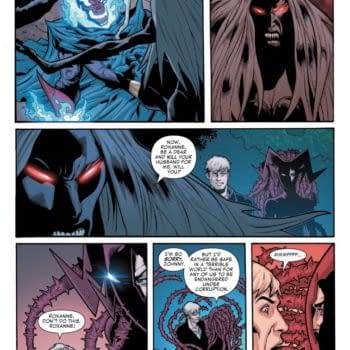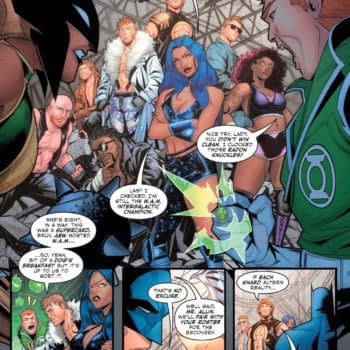Posted in: Comics | Tagged: angela, Comics, marvelman, miracleman, neil gaiman, spawn, todd mcfarlane
Gaiman And McFarlane Settle Over Spawn And Angela

Either way, we're mostly back. Ish. A lot of switches remain off, but hey, that might even mean for a quicker loading time. Certainly quicker that the time it took to settle a certain case.
It began back in 1993 when Neil Gaiman was approached to work on Spawn by Todd McFarlane. He wrote issue 9, introducing characters Cogliostro, Medieval Spawn and Angela, wrote the spinoff Angela mini-series introducing the angelica to the Spawn universe and found three other pages he'd written contributing to another issue.
Then Todd McFarlane bought Eclipse in 1996 for the rights to Marvelman/Miracleman. And, as Neil asked about payment and ownership issues over the characters he'd created for Spawn being used in the rest of the series, McFarlane offered to swap what he owed of Marvelman for what Neil owned of Spawn…
Except, it then transpired that the Eclipse contract that McFarlane had bought, had expired. Then McFarlane believed that Neil Gaiman had misrepresented his deal with DC Comics, on which their deal had been based. And it all went to hell, into the courts, Gaiman suing McFarlane in 2002, McFarlane putting his plans to publish new Mircaleman stories on hold, Gaiman winning, resulting in one of McFarlane's companies being made bankrupt, appeals, more legal issues and the internet being rent in twain.
Well, it's now all being stitched together again.
Gaiman and McFarlane have settled. The Associated Press reports that Gaiman gets half share of the ownership of issues 9 and 26, the first three issues of Angela.
Those issues have been reprinted in collections for almost twenty years, so you can expect an immediate wodge of royalty payments. And there are wider legal implications as well.
Gaiman told the Washington Post "Truthfully, I think all of the decisions were incredibly good for all kinds of copyright. Now the statute of limitations — three years — begins with the discovery of the violation… You can't secretly file copyright on someone else's things."

















